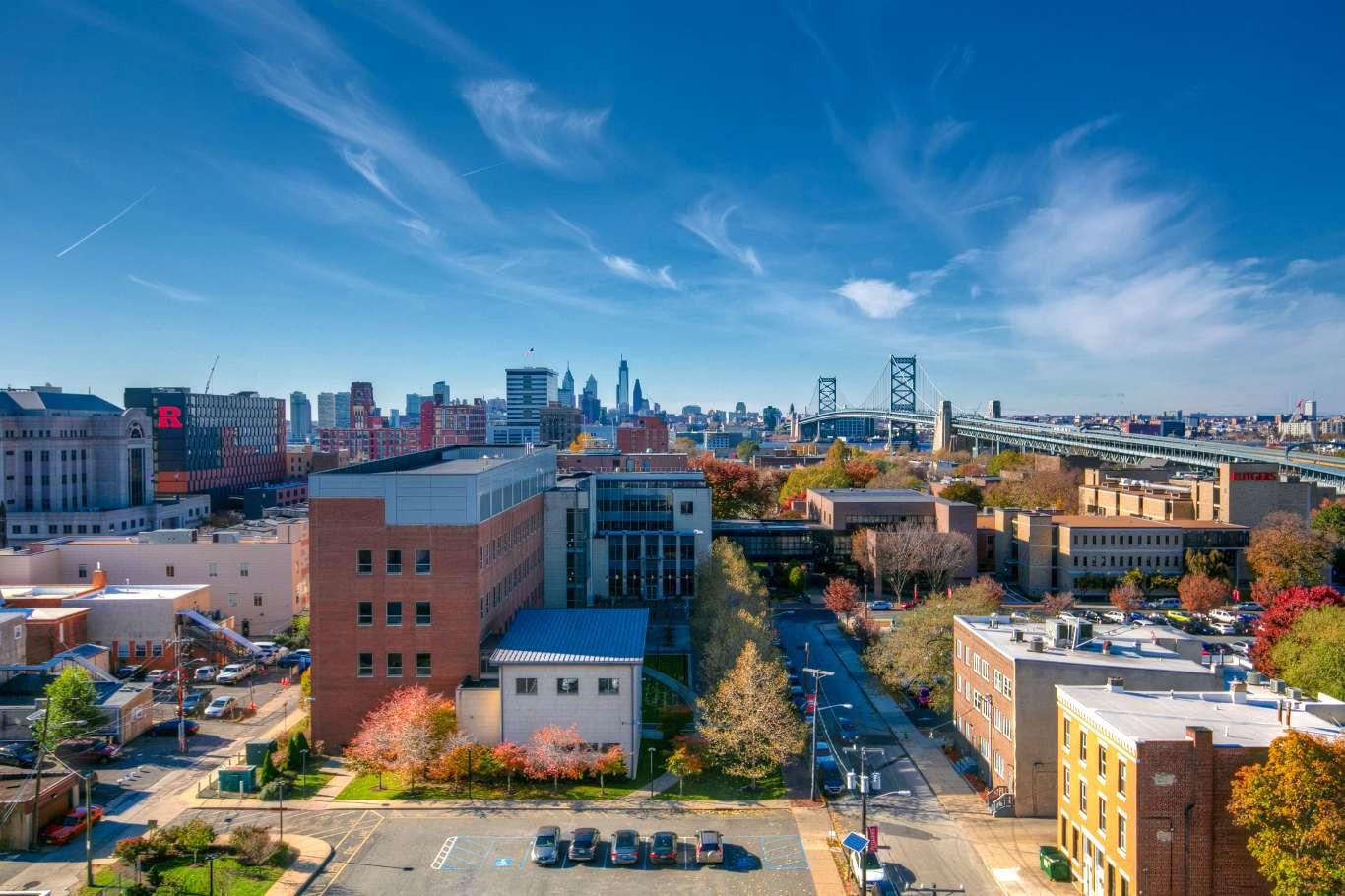

STUDENT SUCCESS
JANUARY 2024
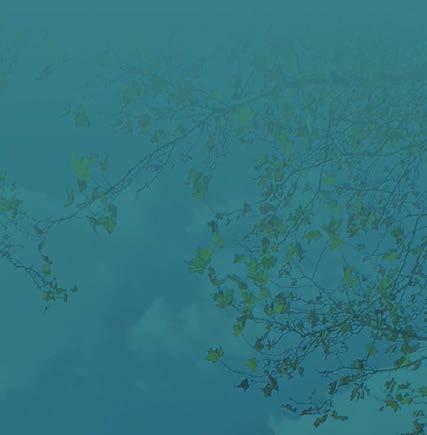
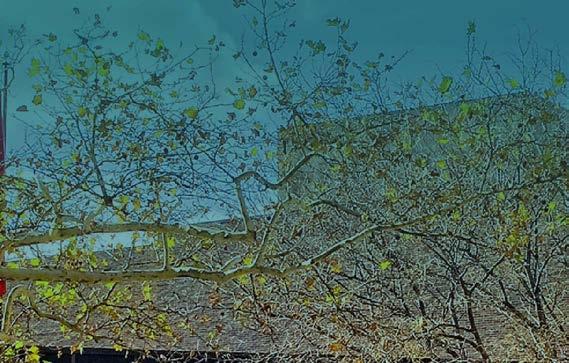


SAS Aligns Priorities With the Campus Strategic Plan: Aims to Increase First-Year Retention and Improve Six-Year Graduation Rates






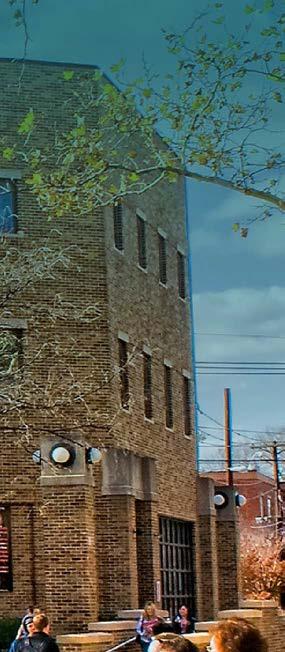


IN THIS ISSUE
TIPS FOR FACILITATING PROGRESS TOWARD STRATEGIC PLAN GOALS
STUDENT SUCCESS OUTCOMES FROM SAS AND BEYOND VOICES FROM THE CAMPUS COMMUNITY


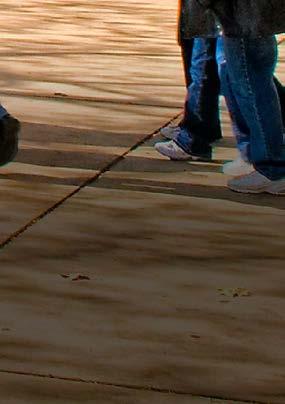





SAS ALIGNS EFFORTS WITH CAMPUS STRATEGIC PLAN
A focus on first-to-second year retention and six-year graduation rates


5
DATA DEEP DIVE
Considerations for addressing CSI results

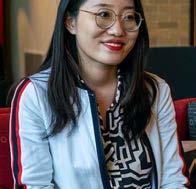









STUDENT SUCCESS INITIATIVES
Celebrating the work of our colleagues
17
RAPTOR RECOGNITION
Interviews with our student success champions
722
DIVISION HIGHLIGHTS
SAS receives $2 million grant, OSDFA continues to make significant strides, and attrition tracking provides new insights
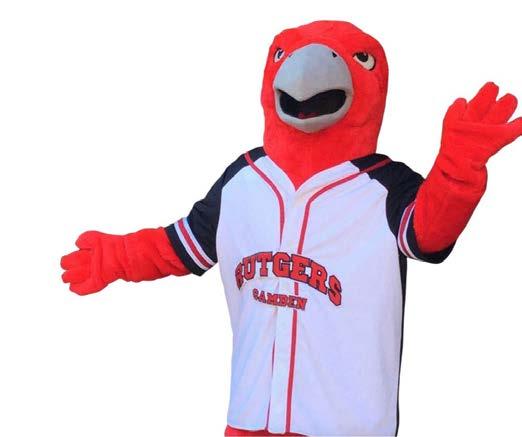

STAY TUNED
Upcoming events and initiatives



The Student Success Insider e-magazine is produced by the Division of Student Academic Success


EDITOR-IN-CHIEF Dr. Kendall Barton
ART DIRECTOR Jamie Victor


For the first time since the pre-pandemic era, Rutgers-Camden is expecting record enrollment numbers for the incoming class of Fall 2024.
With the recent adaptation of the application process and the university’s participation with the Common App, the campus is expecting one of our largest classes in recent memory.
Increased enrollment numbers present exciting possibilities for the campus community, however, to whom much is given, much is required. This means that while we gear up to potentially welcome the largest class ever, faculty, staff, and administrators hold a responsibility to adequately support the success of each and every student.
One measurable outcome that can determine if we’re doing just that is the first-to-second-year retention rate. According to the most recent reporting numbers for RU-C, undergraduate retention rates are lowest for students transitioning between their first and second year (78.7%). Reasons for this may include student dissatisfaction or lack of academic or social integration (Scheglova et al., 2020). However, there’s still much more to explore in order to determine what factors are unique and specific to the RU-C student body. Last fall, the RutgersCamden strategic plan detailed a goal to increase first-year retention by 3.3% over the next five years. During the spring 2024 term, SAS will continue our initial efforts to collect, disaggregate, and analyze retention data to learn more about why students leave and how we can provide targeted support to the populations that need it most. By the end of the semester, academic units will be provided with this data and learn more about our proposed responsive initiatives.
The work is far from over once students successfully progress into their second year. Not only is the objective to get our Raptors to graduation, but more importantly, to obtain their degree within six years or less. Current statistics for RU-C report that the 6-year graduation rates for first-time-in-college (FTIC) students and Pell recipients are 61.4% and 69%, respectively. With goals to improve these rates by up to 6% over the next five years, it remains imperative that our success strategies are sustainable and in-tune with the full duration of the student lifecycle. So, what can we do now to begin addressing the needs of our current Scarlet Raptors and further enhance their commitment to earning a timely degree at RU-C? The approaches range far and wide, but here are some that you might consider:
1 2 3 4
Check in on students about major selection: For two years running, College Student Inventory (CSI) data revealed that the #1 area in which RU-C students want the most help is selecting an academic program. Providing accurate information and prompt guidance for students who are undecided or questioning their major can improve time to degree, overall satisfaction, and commitment to completion.
Increase departmental contact with students: For high-attrition majors specifically, meaningful engagement with students via office hours, research opportunities, or faculty mentoring can significantly increase their interest in course subject matter, likelihood to take advantage of academic support, and sense of connection and belonging.
Di erentiate advising strategies: Advising interventions can look quite different for first-generation students, students of color, and other minoritized groups. For example, some of the factors that influence the academic success of African American students include campus involvement, self-efficacy, and cultural awareness (Grier-Reed, 2013; Thomas et al., 2014). Support staff can play a meaningful role in students’ experiences by introducing relevant student organizations, cultural groups, or high impact activities during advising sessions. Additionally, some first-gen students may not have the full awareness of common policies, procedures, and timelines that exist within the college arena. Text and email nudges from advisors (that occur early and often) about upcoming tasks and deadlines, or providing detailed explanations about specific action items may help to enhance their understanding of what is expected of them and get them to take action on tasks that may be critical to their timely progression.
Assess problematic policies or procedures that are punitive, rather than promote development: If the goal is to encourage continuing students to stay in school, it’s important for campuses to be reflective and assess current practices that may unnecessarily deter completion. For example, what consequences are students faced with when they are placed on academic probation? What is the response if they don’t follow proper protocols within their student organizations? Consider re-evaluating the policies within your own units. Is there room for a learning opportunity rather than penalization?
DATA DEEP DIVE

Retention Results from the College Student Inventory (CSI) Provide Direction for Student Success Efforts
Now in its second year of implementation, the CSI has provided us with invaluable data from which we can begin to compare results and strategically plan meaningful interventions.
The CSI has proven effective in utilizing student motivational factors to predict academic success and retention by way of GPA, credit completion, and fall-to-fall enrollment (Slanger et al., 2015). Based on the data gathered from the incoming class of 2022 and 2023, here are the results that we’ve gained thus far:
STUDENT RISK
Approximately one-fifth of respondents is considered “at risk” in some way, pointing to concerns with factors such as academic difficulty, non-academic stress points that may contribute to academic struggles, and resistance to getting help. These results climbed from 17% in 2022 to 20% in 2023. With this information, we can better pinpoint the types of challenges and specific resources that will best help students maximize their academic progress.
SPECIFIC INTERVENTIONS
In the last two years, about two-thirds of incoming students noted their intention to work 20 or more hours per week. While employment is often a necessity for our students, we can use this information to help students identify on-campus job opportunities with competitive wages, introduce effective time management strategies early on, and determine innovative ways to engage with students that accommodate their work schedules.
DATA
PROGRAMMATIC GUIDANCE
Student responses from 2022 and 2023 demonstrated that half of the top ten priority areas for requested assistance were related to career exploration and development. Similarly, over 60% of students noted plans to pursue a degree beyond their Bachelors. With this knowledge, we hope to expand the reach of the Office of Scholar Development and Fellowship Advising (OSDFA) and enhance collaboration efforts with relevant campus units to better support students in their post-graduate decisions.
THE INEQUITY GAP
Results were consistent between 2022-2023, showing significant differences in financial security between African American and Hispanic students (with African American students having greater financial security) and between Asian and Hispanic students (with Asian students noting greater financial security). This insight helps to focus new funding opportunities on students who are in greatest need.
In preparation for the disbursement of the CSI 2024, the Division of SAS plans to:
• Curate specific questions that will help us track data that is not otherwise available
• Use trends to directly inform programmatic efforts for first-year students
• Use innovative methods to better connect students to campus resources based on specific survey responses
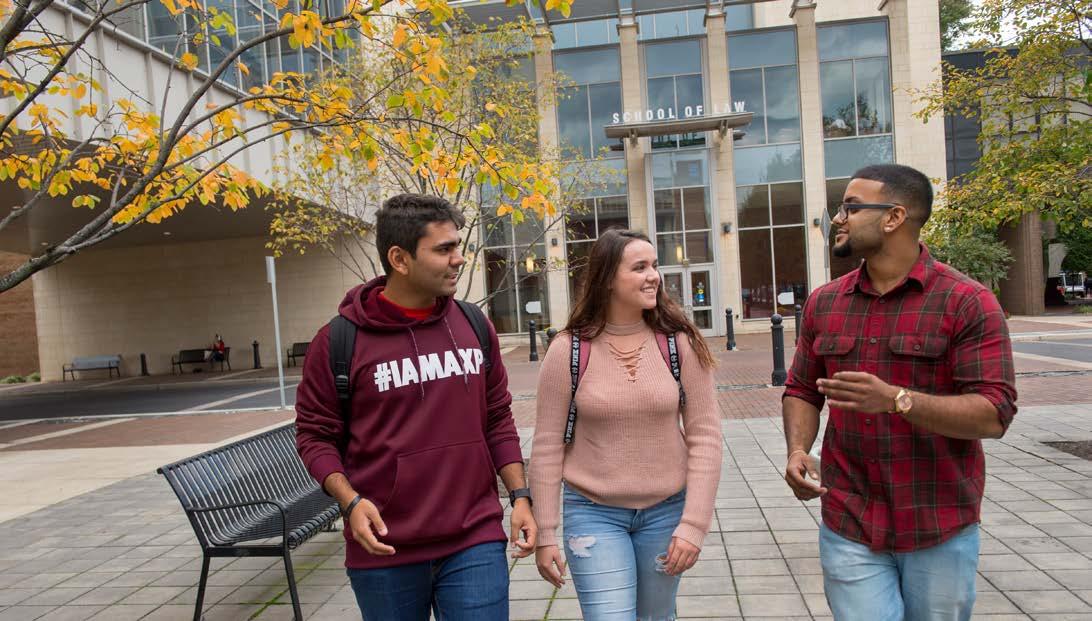
How SAS is doing its part to support our students DIVISION

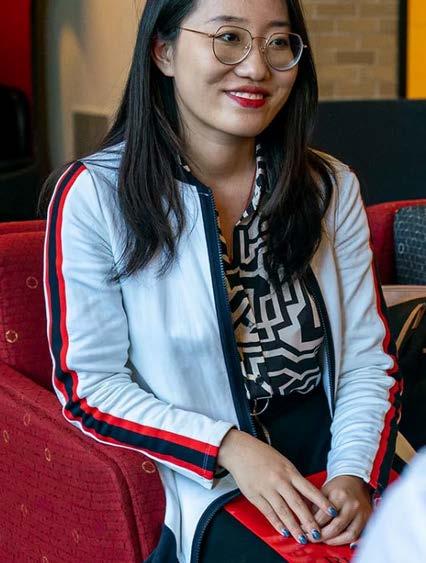

$2 Million Grant Received to Support Asian American and Native Pacific Islander Students
As a formally recognized Asian American (AA) and Native American Pacific Islander (NAPI)-Serving Institution (AANAPISI), with about 12.9 percent of its students identifying as AA or NAPI, RU-C has been awarded a grant totaling almost $2 million from the U.S. Department of Education to support the academic success of this growing population on campus. Spread across five years, the grant dollars will be put toward the unique needs and challenges of this student demographic. To better support the retention, credit accumulation, and completion rates for these students, the Division of SAS will oversee several components of the grant, including the development of a dedicated multicultural research center, academic and success coaching, financial aid literacy activities, a stop-out prevention campaign, and career and graduate school readiness programs. Stay tuned for more developments in the coming months as we finalize programming details.

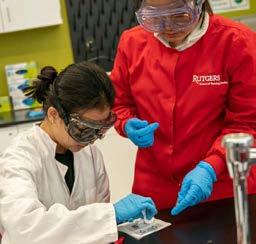

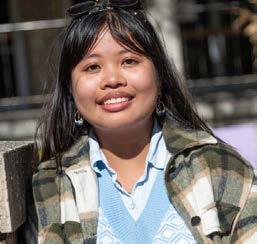
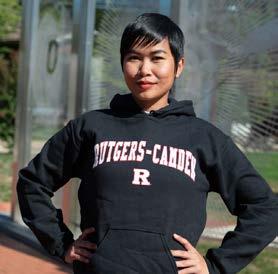
We’ve Been Published
SAS is excited to announce our recent publication in the Journal of Student Affairs Research and Practice: Student Success Coaching is Best Delivered Early and O en. Authored by Tom Dahan, Kendall Barton, and Marsha Lowery, the research investigated the effects of success coaching by examining the timing of the first appointment and frequency of additional coaching. Results demonstrated that each coaching session yielded an effect of about 0.2–0.3 grade points and approximately 0.8 additional credits earned for participating students. The article contributes to the understanding of the timing and frequency effects for success coaching and supports the recommendation that programs should strive to have their first interactions with students before the sixth week of class and aim to offer four to six appointments per semester for maximum impact. We hope that other student support staff working in similar capacities can utilize this information to inform their own practices to better enhance our students’ success.



Angelica Sanchez Benito
Increasing Exposure to Scholarship and Fellowship Opportunities
Upon celebrating its first year as a stand-alone office within SAS, the Office of Scholar Development and Fellowship Advising (OSDFA) has made some significant strides, including the addition of a full-time staff member (Jordan Meyers) to grow their outreach and impact, doubling their points of contact within the community, and increasing student applications for competitive funding opportunities. Among their successes this semester:
• 8 applicants successfully “hit submit” on their Fulbright US Student applications, a 33.33% increase from last year
• 3 alumni applied to the Schwarzman Scholarship; one graduate was named a semi-finalist and the other named an alternate after outstanding interviews with the committee in November
• 3 Pell recipients submitted applications for the Benjamin Gilman scholarship, and Angelica Sanchez Benito was awarded $3,000 to study in Buenos Aires, Argentina, over spring break!
• Sharellis Sepulveda, a 2023 Gilman Scholarship recipient, was named an alternate for the Thomas Pickering Graduate Fellowship and completed an interview for the Rangel Graduate Fellowship
• 3 students successfully submitted applications for the newly introduced Critical Language Scholarship program
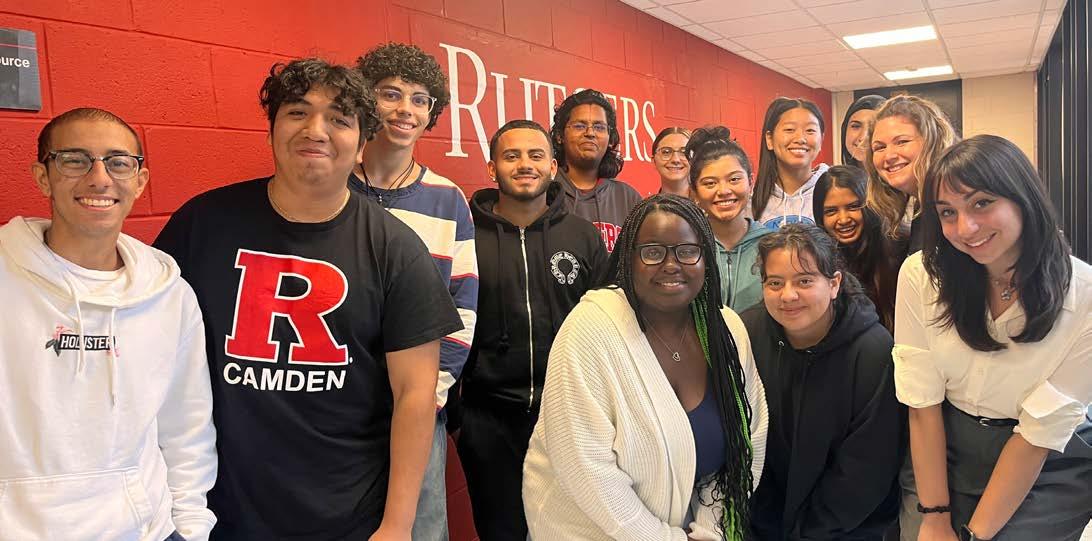
Saturday Scholars Prepares Students for Pre-health Careers
During the fall semester, OSDFA also launched its pilot Saturday Scholars program — a new initiative for first-year, primarily first-generation college students who have expressed interest in pursuing careers in healthcare.
The Saturday Scholars program invited applications from incoming students over the summer and has been supporting a cohort of 20 new Rutgers-Camden students with once-monthly half-day workshops that provide academic support, mentorship, and professional development to strengthen students’ preparedness for success now and as they aspire toward graduate-level education. With the guiding principle that every student can achieve their goals, the Saturday Scholars program aims to eliminate equity gaps so that our first-generation students can explore their identities
and values in a community of like-minded scholars. Evidence for preparatory programs like this points to increases in students’ selfefficacy, help-seeking behavior, and motivation to achieve their goals (Yelorda, et al., 2021). Halfway through the pilot program, feedback from Saturday Scholars participants supports this very notion:
• 94% say that Saturday Scholars has provided them with a sense of community at Rutgers–Camden
• 94% say Saturday Scholars is helping them with their personal and professional development
• 100% say Saturday Scholars is contributing to their belief in their ability to achieve their goals
• 100% say Saturday Scholars is helping to support/develop their positive academic habits and critical thinking skills
• 100% say that as a result of their participation in Saturday Scholars, they are more open to experiential learning and other new experiences
Attrition Tracking Gives Voice to Student Departures
This year, SAS has begun a deep dive into student attrition (the act of leaving the University) to better understand student intentions and behaviors as early as possible — both to prevent attrition, as well as to gain insights into why students leave.
The Retention Office utilized the Navigate platform to create an alert for the campus community to utilize as soon as they are notified that a student is even thinking about leaving. No matter what stage a student may be at — contemplation, planning, or already stopped-out — the SAS retention team schedules communications with them to get more details. If the student is facing barriers that can be resolved, it’s an opportunity to retain that student! If the student has already made their decision to leave, we conduct an interview to find out why, and inquire about
what we can do to better serve students in the future. Of those who noted their intent to withdraw, 37% had plans to return at some point, 40% were planning to make a permanent departure, and 23% of students were unsure about their return to RU-C. Based on current data, students overwhelmingly reported personal and mental health-related issues as reasons for their departure, with financial concerns listed as the second most common response. This feedback aligns with a recent report from Hanover Research, which identified economic hardship as
the main reason keeping stop-outs out of college. As the Retention Office continues to collect data this year, additional insights will tell us more about which students are most adversely impacted and what feasible solutions may exist. In the meantime, if you encounter a student who’s having thoughts about or showing potential signs of leaving the university, we ask that you please use Navigate to issue the “potentially leaving” alert so that we can follow up. For questions about this alert process, feel free to contact Kendall Barton at Kendall.barton@rutgers.edu.

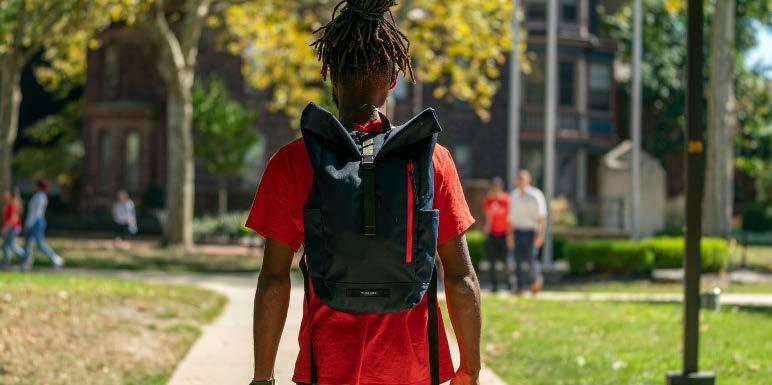


InsideTrack O ers Evidence-Based Strategies for Improving Retention
In October of last year, several SAS team members participated in a 3-day foundational training hosted by InsideTrack — one of the leading nonprofits in learner success, responsible for educating higher-ed professionals on the evidencebased methodology used to support college students at every stage of their journey.
Via their coaching practices, designed to prevent students from dropping out of school, outcomes have included students who were 5% more likely to remain enrolled six months after coaching, and 12% more likely to remain enrolled in the year after the end of coaching (Bettinger & Baker, 2014). Given these results, SAS wanted to learn more about how to implement these proven practices to move the needle on retention at RU-C.
The training consisted of opportunities for participants to engage in interactive learning experiences to establish the fundamentals of coaching and how to engage with students in initial and ongoing meetings. In the six months after completing the Foundational Coach Training, all participants engage in 90-minute monthly follow-up reinforcement training. Additionally, six staff members are working one-on-one
with a certified coach to hone the implementation of their coaching skills so that they can become certified Inside Track trainers. This professional development opportunity has provided staff with new tools, while reinforcing current skills, to promote efficient student interactions with a consistent shared language across all counselors and coaches.
Celebrating the work of our colleagues STUDENT SUCCESS


Rutgers-Camden Awarded $2.5 Million HHMI Grant
The Howard Hughes Medical Institute (HHMI) recently announced RU-C as one of six awardees set to receive funding from the Driving Change Initiative, meant to build inclusive learning environments for students in STEM. Congratulations to the principal investigator for the project, Dr. Kwangwon Lee in the Department of Biology, who introduced the Driving Change STEM Institute and Scholars program (DC). He described it as an innovative initiative aimed at creating a more equitable landscape in STEM education. Rooted in rigorous research and a year-long self-study, this multi-faceted program is aligned with the institution’s broader sustainability and inclusivity goals. DC is designed to support and develop faculty, staff, and students, thereby fostering an enriching and collaborative community. By implementing strategic programs such as cohort-based leadership training, workshops, research opportunities, and community-building activities, DC aspires to enact systemic change. This change will not only transform the educational experience but also contribute to a more inclusive, successful, and enduring STEM learning environment for all students. The program serves as a visionary model for sustainable and equitable changes in STEM disciplines. For more information about this work, please contact Dr. Lee.
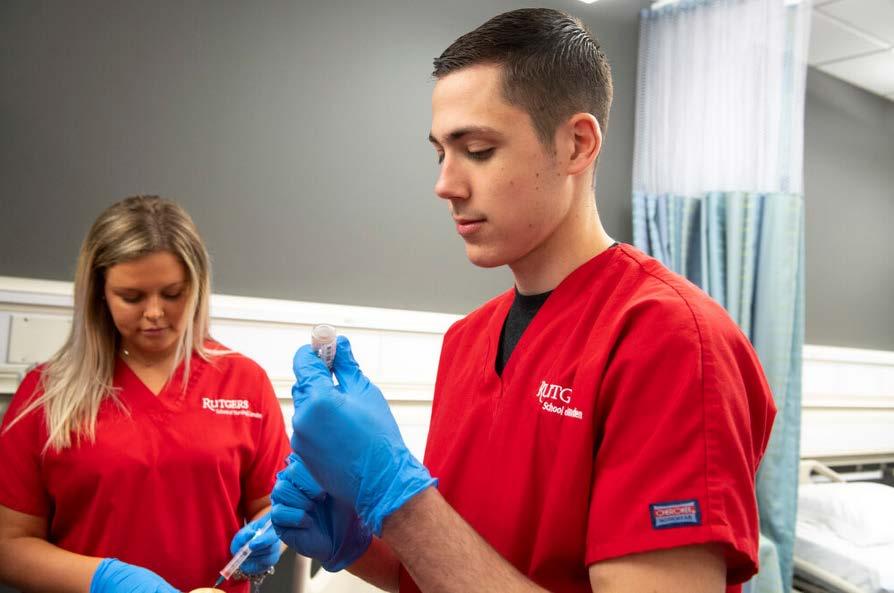

Success Coaching and Summer Bridge Program Show Promise for Nursing Students
This past year, the Rutgers University Camden School of Nursing (RUC-SN) celebrated 50 years of nursing excellence — reflecting on the past, preparing for the present, and looking toward the future with courage, compassion, and commitment to doing the public good. While the path to becoming a RUC-SN graduate nurse is rewarding, it can also be quite challenging. The good news is that students have access to supportive programs and curricula, as well as staff and faculty committed to their success. Through impactful initiatives like success coaching and the Bridge to Junior Success program, students are supported on their journey toward professional nursing practice.
Since March of 2022, a dedicated Nursing Student Success Coach and Retention Specialist has been working with students to promote academic success and intervene to help students remediate when they experience difficulties. This program includes proactive elements, early identification, and interventions to reduce attrition and promote progression through the major. Data has revealed that nursing students improved test scores by an outstanding 21.7 points upon working with their success coach versus a 7.9-point improvement for those who did not. Even more promising is that 89% of students who work with the Nursing Student Success coach pass a class that they were previously failing.
STUDENT SUCCESS
2 3
Recognizing the academic rigor of junior year, the RUC-SN piloted an online summer enrichment program in the summer of 2022, known as the Bridge to Junior Success program. During this experience, rising juniors attended for a few hours per day for six weeks via Zoom and learned pharmacology, pathophysiology, and adult health concepts in preparation for fall classes. Additionally, students learned and applied success strategies like effective note taking, preparation for class, and test-taking. The program continues to run in the summer and is free of charge for students and open to all rising juniors.
By fall 2022, 87% percent of Bridge participants reported more confidence upon completing the program and 79% were “very likely” to recommend the program to other students. More importantly, Health and Illness and Pharmacology course failures were cut by 50% for Bridge participants, compared to students who did not participate in the program. Fall 2023 outcomes are currently being processed. For more information on the RUC-SN success initiatives, please contact Dr. Peg Avallone.
Library Student Advisory Board (LSAB) Encourages Student Advocacy
Initiated in 2020 by Success Librarian, Samantha Kennegiser, the Library Student Advisory Board (LSAB), has recently concluded its third full year of offering students opportunities to be involved with the Paul Robeson Library and advocate for their peers. The Board is an opportunity for students to learn about the library and help to improve library services, resources, and programs based on their own experiences and those of others. During three meetings each semester, the Board reviews current library initiatives, offers ideas for new programs, and discusses any issues or concerns with the library. Past accomplishments of LSAB include cleaning up group study rooms and whiteboards, advocating for open educational resources and promoting the library’s Open & Affordable Textbooks program, recommending changes to the library’s wayfinding signage, and facilitating StressBusters events for students during finals week (e.g., DIY Mini-Zen Garden workshop and repurposing a group study room into a sensory room). Former Board members had the opportunity to present at a regional conference and were published in a library news magazine about their work on the Board. Stay tuned for future projects, including a library art contest and book drive. If you’d like to learn more about this initiative, feel free to contact Samantha Kannegiser.
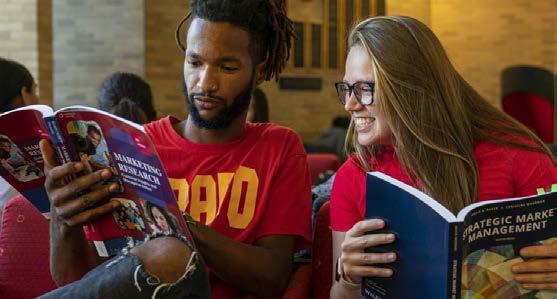

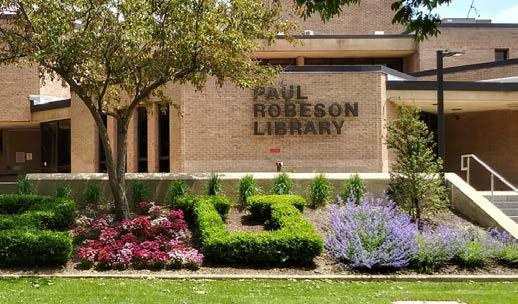
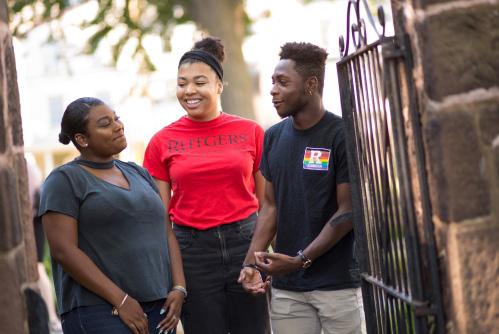
Sankofa Collective Promotes Identity Consciousness Among Black Students
In 2021, with support from an ISGRJ grant, Law professor, Stacy Hawkins, partnered with SAS and the Office of Residence Life to launch the first living learning community (LLC) to center the Black student experience on the Camden campus. This LLC — operating under the name The Sankofa Collective — was designed to replicate resources available to support Black students on both the New Brunswick (Paul Robeson House) and Newark (Honors Living Learning Community) campuses.
The LLC was piloted for the 2021-2022 AY with 12 students, a majority of whom were Black and several who were also first-generation and/or low-income students. In addition to supporting individual student well-being and success, the program was develped in alignment with with several strategic campus priorities, including promoting pedagogical innovation, supporting diversity, equity, and inclusion within the student body, improving retention, and driving academic success for disadvantaged and historically underrepresented students. Drawing on an applied research design, the cohort-based program offered targeted support for participating students by delivering unique social/emotional, cultural/educational, and academic support programming meant to mimic the type of culturally relevant, wrap-around support students receive while attending HBCUs.
STUDENT SUCCESS

Additional funding was provided by DICE to support data analysis of program results and the outcomes are promising, suggesting higher academic achievement in the LLC students than their Camden peers. This year (2023-2024), the program was renewed with grant support from the Educational Equity and Excellence Collaborative (E3C). Professor Nathaniel Wright has joined to co-lead the program, which is administered with the support of two program coordinators assigned through the Office of Residence Life and continued coordination with the Division of Student Academic Success. Black faculty have also generously donated their time to engage with the cohort by presenting talks on their research and scholarship as it relates to the Black community. We are encouraged by the promising pilot data and hopeful that this program will continue to support the well-being and academic success of the Black students here at RU-C.

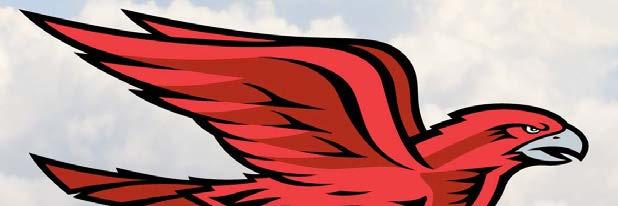




RAPTOR


In each issue of the Student Success Insider, we will highlight members of the campus community whose efforts reflect the Division’s mission to promote student excellence and persistence. If you wish to submit a nomination for someone or alert us of your own work, please fill out our nomination form.





Robert Emmons, Jr. FACULTY
Associate Professor of Filmmaking in the Department of Visual, Media, and Performing Arts

Robert A. Emmons, Jr. is a documentary filmmaker, video essayist, and Associate Teaching Professor of Filmmaking in the Department of Visual, Media, and Performing Arts at Rutgers University-Camden.
From 2016-2020 he was the cofounding Associate Director of the Digital Studies Center. His most recent documentary, Game of Nim (2023) is currently playing at festivals and conferences. His documentaries include, Fugazi’s Barber (2021), Sickies Making Films (2019), Diagram for Delinquents (2014), Goodwill: The Flight of Emilio Carranza (2007), and De Luxe: The Tale of Blue Comet (2010). His non-fiction video essays have been screened at conferences and symposia around the globe and include X9: CHOOSE YOUR OWN ADVENTURE (2022), ChiroMANIA (2018), Fake News (2018), 1 13 5 18 18 25 11 1: An Adaptation of Uncle Buddy’s Phantom Funhouse (2016), and Social Media Narrative (2016). He is currently in production on two new documentary films: Weird as it is (2024) and Chambers of MUON (2025). We chatted with him about the unique ways in which student success can be influenced by visual, media, and performing arts.
How do you personally define student success?
For me, student success has always been built on the idea that, the more you put into something, the more you get out of it. The more you pour yourself into your studies, the more enrichment you will get, the more you participate in campus activities, and the more you’ll grow as an individual. For me, that’s student success. It’s not measured in grades.
What specific pedagogical strategies and practices do you utilize to keep students engaged and to foster their achievement?
I think experiential learning and civic engagement are the keys to successful learning. For me, in the arts, particularly filmmaking, working within the medium and collaborating with others is where real knowledge and growth are formed. Getting inside of an issue, a discipline, a form, gives one an invested perspective. And working with communities around that discipline brings another level. When you work within a discipline and community, you develop a great respect for both. And then, you can honor them and learn from them in all kinds of ways.
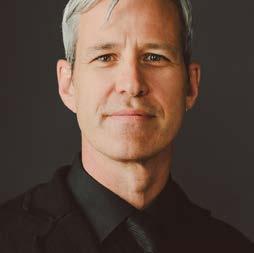

How do you think visual, media, and performing arts can promote student success in ways that differ from the more traditional lecture-style classroom setting?
I think visual, media, and performing arts offers students a freedom and creativity they might not otherwise engage with normally. I love to have non-VMPA majors in my class. They can flex their creative muscles and are offered opportunities they might not have outside the class. I also get to crack the false claim: “I am not a creative person.” We all are. You were when you were a child, it’s always been in you. My courses give students the opportunity to “play” again. I think “play” is something we are largely missing in society today. “Play” is the freedom and opportunity to use one’s full creative abilities, uninhibited by social constRU-Cts.
What is the most rewarding part of your work with Rutgers-Camden students? Students make me more creative. There’s no doubt in my mind I am inspired by my students. They push me as much as I push them towards more creative thinking and practice.
“I think visual, media, and performing arts offers students a freedom and creativity they might not otherwise engage with normally.”




Samantha Kannegiser STAFF
Student Success Librarian for the Paul Robeson Library
Since beginning her role in 2018, student success librarian, Samantha Kannegiser, has collaborated with colleagues within the library and beyond to facilitate student success initiatives like the Personal Librarian Program, the undergraduate research award, and Library Student Advisory Board.
Samantha also liaises to the departments of Childhood Studies, Psychology, and the School of Business to provide library instruction and research support to students and faculty. During our interview, she shared her thoughts on what’s been impactful in improving student achievement from her perspective.
What does student success look like from your perspective?
Student success is best defined by the students themselves, and in my role, I try to give students opportunities to envision what they want to achieve and provide the support that empowers them to accomplish their goals. For instance, students on the Library Student Advisory Board set goals for the Board and develop an action plan to meet those goals within the year. Most often those goals are focused on making a difference on campus and advocating for student needs, and so success for those students depends on the impact they have on the student experience of the library.
Can you tell us the purpose of the Personal Librarian Program and how you’ve witnessed its positive impact on student success over the last few years? How has it changed your interactions with students, staff, etc.?
The Personal Librarian Program connects first-year undergraduates with an individual librarian that supports them throughout their first academic year. The librarian
anticipates the needs of new students and provides just-in-time resources about common questions like how to find course readings in the library, reserve a group study room, or navigate the online library. We also hold events for students to better acclimate them to the library and offer opportunities to meet other new students.
Students in this program have a single library contact that they can rely on, making the library less likely to be a source of anxiety or overwhelm. Many new students don’t know what to expect from a university library or what librarians can help them with, and so this program proactively answers those questions for students who may not know what questions to ask.
I lead this program in collaboration with the Student Success Coach Office, which has been a great experience. The Coaches receive the librarian’s communications to students, so they are more familiar with what the library and librarians provide. We also collaborate on events throughout the semester, which allows us to combine our resources and reach more students with robust programming. One popular event we did in Fall 2023 was a Library Luncheon. We invited students in the Personal Librarian Program to the library for a tour, catered lunch, presentations by various student support departments, and a discussion about favorite study spots on campus.
As a co-coordinator of the Undergraduate Research Award, can you explain what it is, who is eligible, and how others across campus can promote this opportunity to students?
The Paul Robeson Library Undergraduate Research Award recognizes excellence in undergraduate research projects that make use of a range of library resources, collections,


and services. This annual award is open to current Rutgers UniversityCamden students working towards an undergraduate degree in any school. We award $2,250 a year across four tiered awards. Winners are celebrated and they present their work in lightning talks during Research Week.
Faculty and staff can encourage students engaged in any research papers, presentations, or other projects for a semester-long, credited-course to apply this spring. The award may be an additional motivator for students in the midst of research.
What do you think is the biggest misconception that students have about the library and its services, and what would you say to those who might be hesitant to explore the multitude of resources?
Students may believe that the library is simply a collection of books or that they don’t need library resources if they can Google any information they need. The library does have a vast collection of books and access to books in other, non-Rutgers libraries in addition to an extensive online collection of books, articles, journals, and more. The benefit of the library is that we also have librarians who can assist you in searching, finding, and evaluating all these resources so that you find the most relevant information for what you need. Feeling hesitant about exploring library resources is normal — there is so much to navigate, and it can feel overwhelming at first — but it is worth pushing through that reluctance to fully take advantage of what is available to you as a Rutgers student. Librarians are available to help 24/7. We have online chat open 24 hours a day, 7 days a week, a librarian at the reference desk in the library every day, and all the Robeson librarians are available through email.

Jason Lamberty
STUDENT, SCHOOL OF BUSINESS
Junior, Finance Major, minor in Ecomonics


Jason was recently honored as a Raptor Rising Star and his hobbies include singing, playing an active role within his church, and spending time with his dog Casper.
As a first-generation student, Jason came into college not knowing what to expect and has faced his fair share of challenges thus far. More importantly, however, he’s found a way to thrive within the college environment and make a name for himself at Rutgers-Camden. Proudly sporting his TRiO apparel during our interview, Jason took some time to share more with us about his journey as a Scarlet Raptor and the experiences to which he credits much of his success.
What’s your experience been like as a first-gen college student? Are there any specific challenges that you’ve faced or unique perspectives that you bring to the table?
It’s been tough not being able to speak to my mom or to others in my family [besides his brother] about college. Like, understanding how credits work and fighting to get your classes together when I don’t really know what to do. But on the flip side, I’m more motivated because there’s so much on the line. Hungry dogs just want it more. Because nobody else is gonna [get a college degree], so I gotta do it.
What does student success mean to you? What does it look like for you personally?
Well, I came in [to college] feeling lonely and that allowed me to recognize the value of not just community, but more importantly, a village. The difference between a community and a village is that having community just means you have people around you, but in a village, people are willing to pour into you and create a sense of connectedness. Some people might define success as “winning” but success to me is the fruit of having a village that cares about and pours into you. I’m so fortunate because my first year of college was a trainwreck, but since becoming a devout Christian and having people by my side who wanted to see me win, I’ve been able to move on campus and find true peace and physical safety. After that, it was immediate Dean’s list from then on.
In what ways have you committed yourself to the Rutgers-Camden community and how has your active involvement impacted your success either in or out of the classroom? Currently, I’m the worship leader for SHOP (Salvation House of Prayer) on campus. I also was one of the cofounders of our men’s small group. It went from one member to 16 people now. We really focus on leadership, community service, building a community of young men, and we incorporate bible study. I’ve had



the privilege of seeing my friends get baptized and give their life to Christ and grow personally. Words can’t express the joy that I have, having been able to pour into others. It’s really allowed me to grow, too. I’m also a part of HombRes (a Latin male empowerment group focused on community, service, and support for Latinos at RU-C) and was able to travel to a Latin Leads conference in Atlanta, which provided me with so many tools that I desperately needed after being thrusted into so many leadership opportunities. And recently, for the first time in a couple years, I was a part of a singing and dancing program called Magic of Music, which was my friend’s capstone project and that was pretty cool. All of these experiences have helped shape who I am because of the skill sets that I’ve gained, and the people pouring into me showed me the beauty of having a village. A lot of the experiences and opportunities I’ve been given have showed me how to build a village. While leadership is about guiding in one direction, building a village is showing them how to do it, too. I never even thought I’d make it this far in college. What a privilege it is to be able to speak on my experiences now and look at them in hindsight and not be ashamed, but to have learned from them.



Which campus departments have been most influential during your time at RU-C? In what ways? TRiO, Camden Fellows, the Office of Disability Services, and Future Scholars. These are all of the people who made my journey possible. Those were the people who put in countless hours and days, and quite frankly, maybe even sacrificed their own sanity at times to make sure that I had the right opportunities. Their dedication and genuine care for not only wanting to see their students get a degree but also to thrive during and after college is what’s really made an impact. Ms. Melissa and Ms. Railynn for example — they really know how to pull me out of a rut when I’m struggling. Erin Leuthold — she was one of the first people that I met who was so willing to help me. That to me was a culture shock because it was hard for me to say that I needed help. I couldn’t tell my family. What would they have said? “Study more”?




And obviously Mr. Brandon — that’s like my older brother. He’s not just the director of my program — he’s someone that treats me like his own family and that means a lot.
What advice would you give to professors and staff who are looking to better support college students and their success?
To show that you genuinely care about your students. I vividly remember when I had to take this one class three times because I had failed it twice in my first year. I’ll never forget the impact that Professor Deng made on me during my third time in the course. During a time when I was struggling, he simply took the time to ask me what was going on. It may have seemed like a small gesture, but that conversation really gave me the push that I needed, because the imposter syndrome is real. Failing over and over again was crazy, but on my final attempt in the course, I got an A.

I think professors often overlook the simple gesture of having genuine care for their students, but we notice and respect it. That conversation shifted my perspective a lot and forced me reflect more about what I needed to change to succeed. If you [professors] care, it changes the way that students behave. A lot of the other things just kind of fall in to place more easily.
What’s your proudest accomplishment as a Rutgers-Camden student? As a first-gen student coming in feeling alone, my proudest accomplishment is having built a community on campus with others and seeing what we have been able to accomplish together. I’m proud to have contributed to a lasting community that continues to grow and will make an impact even after I’m gone. With my village, the things that could’ve been stumbling blocks were instead blocks to build upon.
“As a first-gen student coming in feeling alone, my proudest accomplishment is having built a community on campus with others and being able to see what we have been able to accomplish together.”
STAY






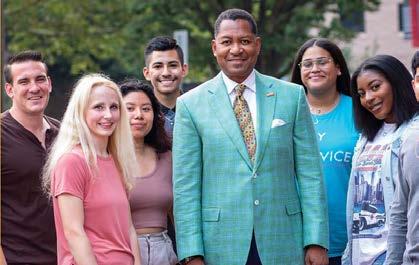
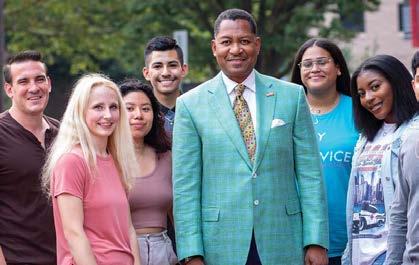



Details on the new SAS Strategic Plan
A division-specific 5-year plan focused on improving first-year student retention rates and 6-year graduation rates.
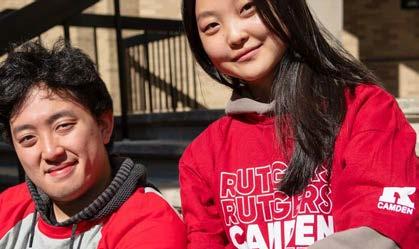
AANAPISI Program Updates
More details on our comprehensive plan to support the Asian American and Native American Pacific Islander student body at RU-C.

Changes to New Student Orientation
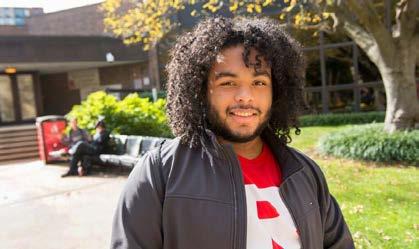

First-Gen Graduation Programs Action items in response to CSI data
Our students spoke, and we listened! Feasible solutions for addressing the most prominent needs and supporting students’ strengths.




